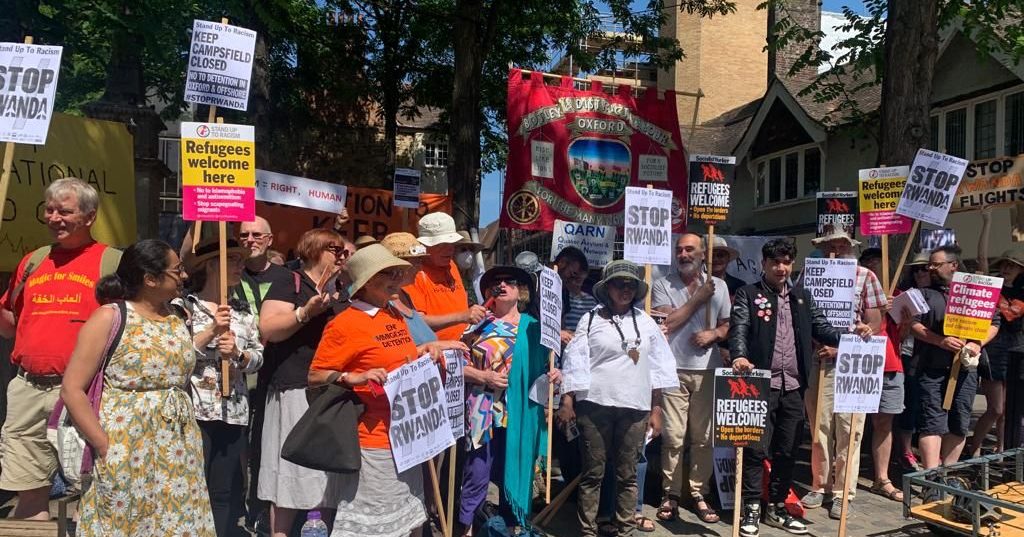Refugee Advocacy: Where to Begin?
There is no single focal point for refugee advocacy, beyond our commitment to stand up for the rights of displaced people. The wide range of advocacy issues and campaign strategies currently being pursued reflect the numerous hardships encountered by refugees in Britain. Change is coming thick and fast, especially since the government’s announcement of its ‘New Plan for Immigration’ in early 2021, and it can be difficult for campaigners to keep up. Some organisations have responded by focussing all their attention on one policy area, whilst others have attempted to respond to a range of issues simultaneously. Simply put, there is so much wrong with the asylum system that it’s difficult to know where to start!
Current advocacy issues can be grouped loosely as: offshore detention; onshore detention and hotel accommodation; changes in legislation and difficulties claiming asylum; channel crossings; additional vulnerabilities (gender, age, sexuality, disability, etc.) We have summarised some of the key developments and actions below.
Offshoring to Rwanda
The passage of the Nationality and Borders Act in April 2022 paved the way for the use of offshore detention. On 13th April, the UK struck a highly unpopular deal with the Rwandan authorities to begin plans for removing people to Rwanda before hearing their asylum claims. UK taxpayers have already handed over £120 million to the Rwandan authorities under the ‘UK-Rwanda Migration and Economic Development Partnership.’ On the week of 10th May, new arrivals to the UK began receiving notices of intent of removal to the East African country. The first flight was set to take off on 14th June, and the High Court decided against granting a last-minute injunction to prevent its departure. Nevertheless, the flight (chartered at a cost of £500,000) was cancelled before take-off following an intervention from the European Court of Human Rights.
The Public and Commercial Services Union (PCS), Detention Action and Care4Calais are continuing with their legal action against the flights to Rwanda. They consider the Rwanda removals policy to be ‘unlawful on multiple bases,’ arguing that the Home Secretary lacks the legal authority to carry out the removals, that provision for malaria prevention is inadequate, that the policy’s fails to comply with the Human Rights Act, and that Rwanda cannot be considered a ‘safe third country’. The hearing, originally scheduled for 19th July, has been adjourned until Monday 5th September. While no removal flights will take place until a new Conservative party leader is in place, and despite much high-profile criticism, the leadership candidates remain steadfast in their plans to uphold the scheme.
What Can I Do?
- Send a selfie holding a ‘Stop Rwanda’ or ‘No Offshoring to Rwanda’ sign to hari at rrsg.org.uk
- A demonstration will take place outside the Royal Courts of Justice between 9am-5pm on the 5th September, with a rally at 2pm.
- Freedom from Torture has created a petition you can sign calling on all Conservative leadership candidates to scrap the Rwanda scheme.
- City of Sanctuary has suggested tweets and social media resources you can use to contact Conservative leadership candidates on social media.
- MSF have shared a useful piece debunking five lies the Home Office uses to justify the Rwanda plan, which includes tips and prompts for writing to your MP on this issue.
Nationality and Borders Act and Channel Crossings
While the Nationality and Borders Bill was voted through in April, parts of the act only came into effect on 28th June, including the ‘differentiated treatment’ of refugees. From 28th June, those who arrive via irregular routes after 28th June (so-called ‘tier two’ refugees) will receive ‘temporary permission to stay’ rather than full refugee status. This status will need to be renewed every 2.5 years, a total of four times (compared to two previously), until they are eligible for Indefinite Leave to Remain after ten years’ residency (compared to five previously). Access to family reunion will also be limited, although rights work and access benefits will not be. Similarly, humanitarian protection status will become ‘temporary humanitarian permission to stay’.
While the justification for much of the Nationality and Borders Act is to deter channel crossings and ‘break the business model of people smuggling,’ we have always known the logic behind this is shaky. In fact, more than 15,400 people have crossed the Channel so far this year, nearly double the rate at the same point last year, suggesting the ‘two-tier system’ has not had the deterrence effect intended. The House of Commons Home Affairs Select Committee report on channel crossings, migration and asylum agrees that such policies are unlikely to deter unsafe channel crossings.
What Can I Do?
- You can sign the pledge created by Refugee Action to Fight the Anti-Refugee Laws, or encourage your MP to do the same. The pledge has already been signed by more than 30 MPs and over 400 organisations across the UK.
Unsuitable Accommodation
Refugees and asylum seekers are currently held in a range of unsuitable accommodation: asylum hotels; dispersal accommodation in isolated areas; traditional detention centres; new repurposed ex-military facilities. The Home Office currently faces a backlog of more than 90,000 outstanding asylum applications, and the issue of accommodating asylum claimants grows with the delay in processing applications.
Asylum Hotels
After an individual is ‘intercepted’ in the channel, they are brought to Dover for identity checks, security checks, and initial asylum screening. They are then ‘securely moved to suitable accommodation locations as quickly as possible.’ Increasingly, this means being moved into temporary hotel accommodation, both in Berkshire and across the UK. Despite the government’s promised to end the use of hotels, the Refugee Council found that ‘the hotel population of people seeking asylum almost tripled over the course of 2021, with a staggering 26,380 people being accommodated in hotels across the UK at the end of 2021.’ Their research report, Lives on Hold: The Experiences of People in Hotel Asylum Accommodation, explores the barriers and delays faced by those in hotel accommodation. The report details the impact of prolonged hotel stays on child development, and the damage caused to people’s health and wellbeing, including depression and suicidal ideation. The Observer has also reported a rise in deaths in asylum accommodation over the last two years.
Closed Reception Centres
It currently costs taxpayers almost £5 million a day to accommodate 37,000 asylum claimants and Afghan refugees in hotels. The government has announced they will be using repurposed military facilities to accommodate asylum claimants as a cheaper alternative to hotel accommodation. The first ex-military facility to be converted is a former RAF base in Linton-on-Ouse, a village of 600 people. The centre is set to accommodate 1,500 single men between the ages of 18 and 40. While it was scheduled to open at the end of May, preparation work has been put on hold until the new prime minister is in post.
Local politicians and members of the public have strongly opposed the plans, particularly as there was no consultation with MPs, councils or local residents. They consider the site unfit for purpose because: the population of the centre will outnumber the population of the village almost three-to-one; the remote location and lack of public transport will leave refugees isolated; local facilities including doctors, dentists and mental health support will be overwhelmed; access to necessary legal services (beyond Migrant Help) will be a huge challenge. Residents of the village have also been targeted by far-right activists.
Despite the concerns raised about the use of Napier Barracks as an accommodation facility, six further ex-military bases have been earmarked to accommodate 30,000 asylum claimants if the reception centre at Linton-on-Ouse can be shown to work. These will be semi-closed facilities, with residents expected to be onsite overnight. They will feature daily ID check, external and internal CCTV, a controlled access point and security perimeter patrols.
Detention Centres
Traditional detention infrastructure is expanding alongside hotels and ‘closed reception centres’, despite the government’s commitment in 2016 to shrink the British detention estate. The government announced on 28th June that Campsfield House detention centre in Oxfordshire, which closed in 2018, will reopen in late 2023. A mixture of refurbished and new-build accommodation, the centre will be designed for around 400 men: foreign national offenders and so-called ‘immigration offenders’ set to be removed from the UK. Meanwhile, Women for Refugee Women launched a legal case against the Home Office because women accommodated at Derwentshire detention centre near Durham have not had access to in-person legal advice. Unfortunately, this case was unsuccessful, but it highlighted an ongoing lack of access to legal support in detention centres.
What Can I Do?
- Read about the alternatives to detention; have an answer ready if anyone tells you that there are no other options.
- The Action Network has created a template MP letter to oppose the use of repurposed military accommodation centres. it takes just two minutes! Download as a document here.
- Join the Coalition to Keep Campsfield Closed. Coalition meetings take place on the first Tuesday of each month. The next meeting is on Tuesday 2nd August at 6pm: please join here.
- Follow and amplify the work of the Linton-On-Ouse Action Group and No To Hassockfield.





